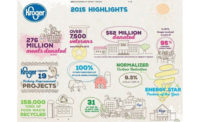Oscar Mayer parentKraft Foods, Northfield, Ill., announced expanded sustainability goals and highlighted progress against its focus areas. Officials said the company's new goals – now including the Cadbury and LU businesses acquired since 2007 –build upon previous success around energy, carbon dioxide, water, waste and packaging reductions.
For the 2010-2015 time frame, Kraft Foods has added transportation and agricultural commodities to what it will be measuring. Significantly, all of the company's European coffee brands have committed to sustainably source 100 percent of their coffee by 2015.
"We're building upon our successes to date," said Steve Yucknut, vice president, Sustainability. "We're learning, improving and looking beyond our four walls for opportunities. Our new goals will help us do more. For example, our increased focus on sustainable agriculture will further boost our scale to help accelerate long-range development in more communities and for more commodities than ever before."
New sustainability goals raise the bar. From a 2010 base, by the end of 2015 Kraft Foods plans to:
* Increase sustainable sourcing of agricultural commodities by 25 percent
* Reduce energy use in manufacturing plants by 15 percent
* Reduce energy-related CO2 emissions in manufacturing plants by 15 percent
* Reduce water consumption in manufacturing plants by 15 percent
* Reduce waste at manufacturing plants by 15 percent
* Eliminate 50,000 metric tons (100 million lbs.) of packaging material
* Reduce 80 million km (50 million miles) from transportation network
Officials said Kraft Foods already has made significant progress reducing energy, CO2 emissions, water, waste, packaging and transportation across its global operations. Specifically, from 2005 through 2010:(3)
* Energy use is down 16 percent
* CO2 emissions are down 18 percent
* Incoming water is down 30 percent
* Net waste is down 42 percent
* Packaging is down 100,000 metric tons (200 million lbs)
* 16 million km (10 million road miles) have been removed from its network
Get our new eMagazine delivered to your inbox every month.
Stay in the know on the latest food and beverage manufacturing markets.
SUBSCRIBE TODAYCopyright ©2024. All Rights Reserved BNP Media.
Design, CMS, Hosting & Web Development :: ePublishing


